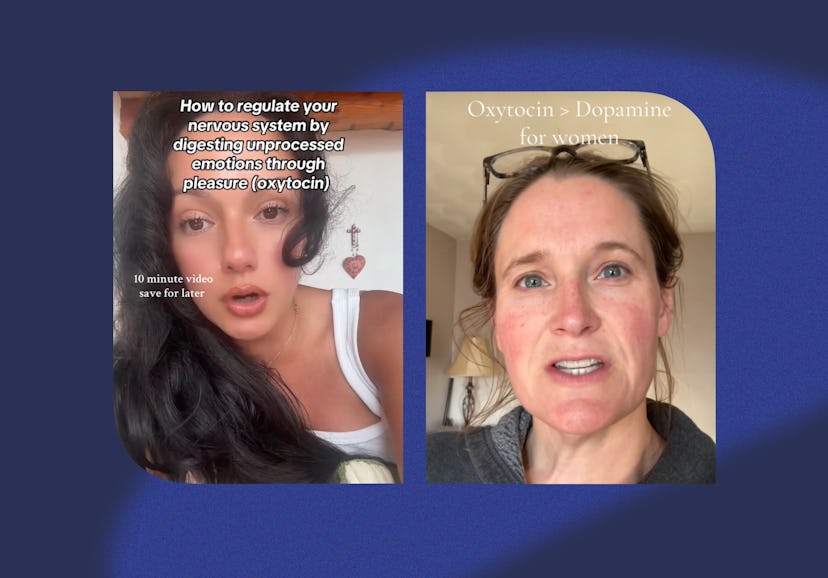Wellness
The Case For Scheduling Eye Contact
Who doesn't want a little oxytocin boost?

When you want to be happier, dopamine is where it’s at. There’s the "dopamine dressing" trend, where you wear funky patterns to boost your mood, "dopamine decor" where you splash your house with color, and the viral “dopamine menu” trend that perks you up enough to be productive.
While a zing of the well-known hormone always feels good, it’s said that oxytocin is what makes you feel really great. On TikTok, creators are talking about the importance of boosting your oxytocin, especially in the winter when it’s common to feel isolated or sad, and they’re proving it’s so much more than just a “love hormone.”
According to Dr. Easton Gaines, a New York State clinical psychologist and founder of MindCare Psychology, you can think of oxytocin as the hormone of connection — the one that swells when you get a hug, make eye contact, or pet your dog. “It’s the chemistry behind belonging, trust, and that grounded feeling of being held — by another person or by life,” she tells Bustle.
While dopamine is the spark of happiness that comes with novelty and excitement, oxytocin is more like the slow, sustainable anchor. “Dopamine revs us up while oxytocin roots us down,” she says. “Both matter, but only one helps us stay connected to ourselves, to each other, to what actually fulfills us.” Here’s what to know about oxytocin, including how to boost it.
Why You Need More Oxytocin
Just like the other hormones in your body, oxytocin can take a nosedive. “It’s highly responsive to how safe or connected we feel,” Gaines says. If your life is overwhelming, you’re doing too much in a day, or you’re experiencing conflict, you can expect your oxytocin levels to dip.
It might show up as chronic stress, irritability, emotional disconnect, numbness, or burnout. A lack of oxytocin can also lead to a sense of isolation, loneliness, or feeling tired all the time, and it makes it tough to be vulnerable. “They’re signs your body is hungry for connection,” she says.
According to clinical psychologist Dr. Jenna Budreau-Roman, Psy.D., a boost of oxytocin will regulate your stress, calm your heart rate, lower cortisol, and help you feel grounded and OK — and that’s why you should seek it out every day. “You don’t need to overhaul your life,” she tells Bustle. “Even tiny moments of warmth or connection can meaningfully shift your mood.”
How To Boost Oxytocin
Just like dopamine, which you can level-up with fun experiences — think enjoying an upbeat workout class or your favorite food — you can do little things to boost your oxytocin levels, too. Gaines recommends starting with physical touch, like a hug, a hand hold, or a cuddle with your partner. It will tell your nervous system that you’re safe and secure, she says.
Eye contact is another biggie. According to Budreau-Roman, a warm gaze is one of the oldest bonding behaviors we have. “That small moment of ‘I see you’ activates oxytocin and quiets the stress response,” she tells Bustle.
It’s why she recommends scheduling eye contact into your day. “It sounds funny, but a lot of [people] benefit from intentionally practicing eye contact,” she says. It doesn’t have to be anything intense, like an hour-long staring contest. Just 20 to 30 seconds once or twice a day, maybe while you chat with a friend or catch up with a partner, can create a shift in your well-being.
To boost oxytocin on your own, you can watch something that makes you laugh, go for a walk, take a warm bath, hum a song, stretch or do yoga, pet your dog or cat, or give yourself a hug. Listening to fun music and dancing also helps it surge, as can mini acts of kindness for others.
“Giving care and receiving care both activate the same bonding pathways,” Gaines says, so think about volunteering, reading up on a charity and making a donation, bringing donuts into the office for your coworkers, or helping your neighbor with their groceries. Do these things on a regular basis and your oxytocin levels will soar.
Studies referenced:
Dreisoerner, A. (20210). Self-soothing touch and being hugged reduce cortisol responses to stress: A randomized controlled trial on stress, physical touch, and social identity. Compr Psychoneuroendocrinol. doi: 10.1016/j.cpnec.2021.100091.
Sources:
Dr. Easton Gaines, clinical psychologist, founder of MindCare Psychology
Dr. Jenna Budreau-Roman, Psy.D., clinical psychologist